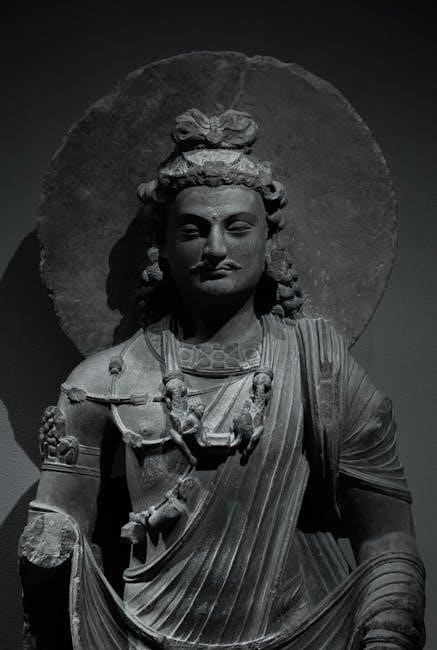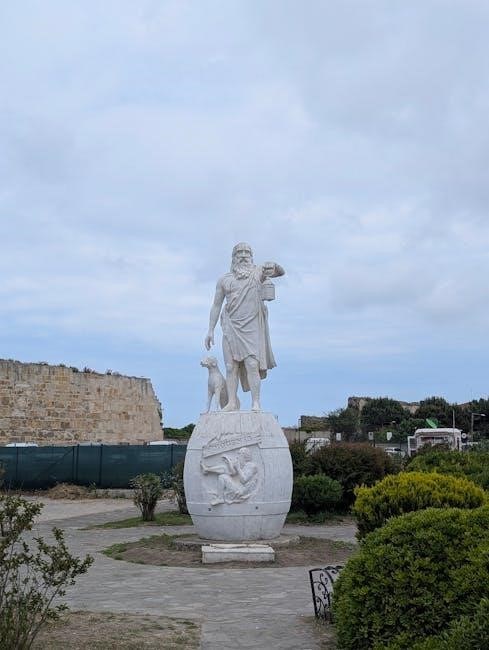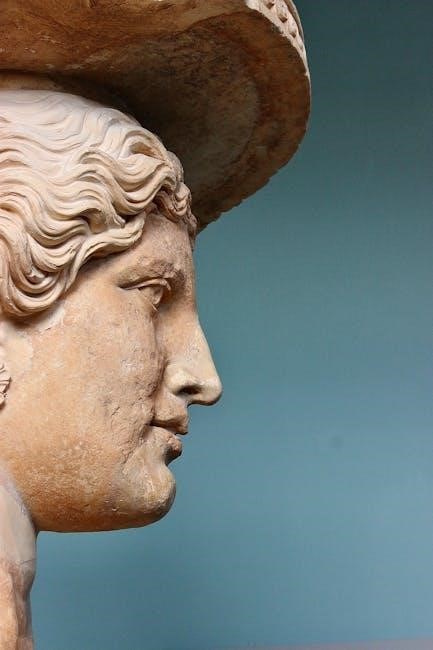In Percy Jackson’s Greek Gods‚ Rick Riordan crafts a captivating guide to Greek mythology‚ narrated by Percy Jackson with humor and insight‚ making the gods relatable and their stories fresh and engaging for modern readers․
Overview of the Book and Its Significance
Percy Jackson’s Greek Gods reimagines classic Greek mythology through Percy Jackson’s witty and relatable voice‚ offering a fresh perspective on timeless stories․ The book serves as both an entertaining guide and a learning tool‚ making Greek mythology accessible to a modern audience․ Its significance lies in its ability to bridge the gap between ancient myths and contemporary readers‚ while maintaining the original tales’ richness and complexity․ Illustrated by John Rocco‚ the book captivates readers of all ages‚ making it a valuable resource for educators and fans alike․ Its unique narrative style ensures that Greek mythology remains engaging and relevant in today’s world․
Percy Jackson as a Modern Retelling of Greek Mythology
Percy Jackson’s Greek Gods masterfully reimagines Greek mythology through a modern lens‚ blending humor and relatability․ Rick Riordan breathes new life into ancient tales by infusing them with Percy’s sarcastic asides and contemporary perspective․ This retelling not only preserves the essence of Greek myths but also makes them accessible to today’s readers․ By presenting gods and monsters in a fresh‚ engaging way‚ the book sparks curiosity and appreciation for classical stories among younger audiences․ Riordan’s approach ensures that Greek mythology remains vibrant and relevant‚ proving its timeless appeal in a modern context․

The Olympian Gods in Percy Jackson’s Greek Gods
Percy Jackson’s Greek Gods vividly portrays the Olympian deities‚ blending humor with mythology․ Zeus’s power‚ Poseidon’s mysteries‚ and Hades’s realm are explored‚ highlighting their roles in Percy’s world․
Zeus and His Thunderous Rule
In Percy Jackson’s Greek Gods‚ Zeus is portrayed as the mighty ruler of Mount Olympus‚ wielding his iconic lightning bolts․ His thunderous authority commands respect‚ yet his temper is legendary․ Percy highlights Zeus’s protective nature‚ emphasizing his role in maintaining cosmic order․ Zeus’s battles‚ such as defeating Typhoeus‚ showcase his power and the challenges he faces․ Percy’s narrative adds humor‚ noting Zeus’s strict demeanor and occasional flaws‚ like his infamous short fuse․ Through Percy’s lens‚ Zeus emerges as a complex figure—both a fearsome leader and a flawed god‚ making him relatable and intriguing to modern readers․

Poseidon and the Mysteries of the Sea
Poseidon‚ the powerful god of the sea‚ is portrayed in Percy Jackson’s Greek Gods as a complex figure‚ ruling over the vast oceans with immense strength․ As Percy’s father‚ Poseidon’s influence is deeply personal‚ yet his responsibilities extend far beyond family ties․ The book highlights Poseidon’s role in controlling the tides‚ earthquakes‚ and marine life‚ emphasizing his vital connection to the natural world․ Percy’s narrative adds a modern twist‚ blending humor with reverence‚ while also exploring Poseidon’s lesser-known stories‚ such as his rivalry with Athena and his creation of horses․ This portrayal captures the god’s majesty and enduring mysteries․
Hades and the Underworld
In Percy Jackson’s Greek Gods‚ Hades is depicted as the ruler of the Underworld‚ governing the dead with a stern yet fair hand․ Percy’s narrative highlights Hades’ misunderstood nature‚ often overshadowed by his grim responsibilities․ The god’s role in maintaining balance by overseeing the deceased is central‚ with stories like the abduction of Persephone adding depth․ Hades’ iconic helmet of darkness and his loyal three-headed dog‚ Cerberus‚ are also featured‚ showcasing his authority․ Percy’s witty commentary brings modern humor to Hades’ ancient tales‚ emphasizing the importance of respecting the dead and the mysteries of the Underworld‚ a realm both fearsome and fascinating․

The Titans and Their Stories
The Titans‚ powerful primordial deities‚ play pivotal roles in Percy Jackson’s retelling․ Kronos‚ the leader‚ and Atlas‚ the burdened giant‚ exemplify the chaos and struggles of Greek mythology․
Kronos and the Fall of the Sky
Kronos‚ the feared Titan king‚ ruled with an iron fist‚ driven by a prophecy that his child would overthrow him․ To prevent this‚ he swallowed each of his offspring as they were born․ However‚ his wife Rhea deceived him by giving him a rock instead of Zeus‚ their youngest child․ Zeus survived‚ grew strong‚ and eventually forced Kronos to cough up his siblings‚ freeing them․ This act of defiance led to the Olympian gods’ rise and the Titans’ downfall․ Kronos’s story highlights themes of power‚ fear‚ and the inevitable fall of tyranny‚ as seen in Percy Jackson’s vivid retelling of Greek myths․
Atlas and His Endless Burden
Atlas‚ the Titan‚ suffered a fate worse than death after the Olympian gods’ victory․ Zeus punished him by forcing him to hold the sky on his shoulders‚ a task of immense burden․ Despite his strength‚ the weight was relentless‚ a constant reminder of his rebellion․ Yet‚ Atlas’s story reveals a glimmer of heroism; he endured his fate without complaint․ Percy Jackson retells this myth with his signature humor‚ imagining the Titan’s plight while highlighting the consequences of hubris․ The story of Atlas serves as a cautionary tale about the price of defiance against the divine and the enduring nature of duty and responsibility․

Mythological Creatures and Their Roles
In Percy Jackson’s retelling‚ mythological creatures like Typhoeus and others are vividly portrayed‚ showcasing their fascinating roles in shaping Greek mythology and its modern interpretations․
Typhoeus and the Monster Threat
Typhoeus‚ a monstrous giant in Greek mythology‚ poses a formidable threat to the Olympian gods․ In Percy Jackson’s Greek Gods‚ his terrifying appearance and immense power are vividly described․ Typhoeus‚ born from Gaea’s anger‚ is so large that his head touches the stars‚ and his arms can swipe entire mountains․ Zeus‚ with the help of his allies‚ confronts Typhoeus in an epic battle‚ showcasing the king of the gods’ protective nature and fearsome temper․ The story highlights the dangers of hubris and the importance of unity among the gods․ Typhoeus’s defeat underscores Zeus’s role as a protector and the delicate balance of power in the Greek world․
- Typhoeus’s monstrous size and strength make him a unique threat․
- Zeus’s leadership and the gods’ collaboration are key to his defeat;
- The battle illustrates themes of power‚ fear‚ and divine authority․
Hephaestus and the Art of Blacksmithing
Hephaestus‚ the god of fire and blacksmithing‚ is uniquely portrayed in Percy Jackson’s Greek Gods as a skilled yet misunderstood deity․ Despite his physical disability‚ Hephaestus excels in crafting extraordinary weapons and armor‚ showcasing his artistic brilliance․ His workshop‚ filled with magical automatons‚ highlights his ingenuity․ Hephaestus’s creations‚ such as Achilles’ invincible armor and Zeus’s iconic lightning bolts‚ are central to Greek mythology․ Percy Jackson’s narrative adds a modern twist‚ emphasizing Hephaestus’s importance and the beauty of his craft‚ proving that even the gods value skill and creativity over physical perfection․
- Hephaestus’s craftsmanship is unmatched among the gods․
- His creations are pivotal in legendary battles and myths․
- His story challenges perceptions of perfection and ability․
The Significance of Mount Olympus
Mount Olympus‚ the divine realm of the gods‚ towers above the clouds‚ symbolizing power and immortality․ Percy Jackson’s narrative brings this sacred place to life‚ exploring its mystique and importance in Greek mythology․

The Geographic Center of the Greek World
Mount Olympus‚ the highest mountain in Greece‚ is revered as the geographic and spiritual heart of the ancient Greek world․ In Percy Jackson’s Greek Gods‚ it is described as the awe-inspiring home of the Olympian gods‚ where Zeus’s palace stands tall․ Percy Jackson highlights its grandeur and intimidation‚ emphasizing its role as a symbol of divine power and immortality․ The mountain’s physical presence and mythical significance make it a central landmark in Greek mythology‚ bridging the mortal and divine realms; Its importance is further underscored by its association with Zeus’s rule and the governance of the cosmos․
The Oracle of Delphi and Its Importance
The Oracle of Delphi‚ a sacred site in Greek mythology‚ plays a pivotal role in Percy Jackson’s Greek Gods․ It is depicted as the mouthpiece of the gods‚ particularly Apollo‚ who speaks through the Oracle to guide mortals and immortals alike․ Percy Jackson highlights its significance as a bridge between the divine and human worlds‚ where crucial decisions are often influenced by its prophecies․ The Oracle’s cryptic yet powerful messages shape the destinies of heroes and gods‚ making it a cornerstone of Greek mythology․ Its importance is further underscored by its role in guiding Percy and other characters through their quests and challenges․
Themes and Lessons from the Book
Percy Jackson’s Greek Gods explores themes of power‚ hubris‚ and respect for the divine‚ offering lessons on survival and the consequences of human and godly actions․
Power‚ Hubris‚ and Respect for the Divine
In Percy Jackson’s Greek Gods‚ themes of power‚ hubris‚ and respect for the divine are central․ Zeus’s thunderous rule exemplifies the dangers of unchecked power‚ while Typhoeus’s monstrous threat highlights Zeus’s protective yet fearsome nature․ Percy’s narrative underscores the consequences of hubris‚ as seen in Kronos’s downfall and Atlas’s endless burden․ These stories emphasize the importance of respecting divine authority while cautioning against overreach․ Percy’s humorous insights make these ancient lessons relatable‚ reminding readers that understanding and respecting the gods’ power is crucial for survival in a world where myth and reality collide․
Survival Tips for Encounters with Gods
Percy Jackson’s guide offers practical advice for surviving encounters with gods․ He emphasizes the importance of showing respect‚ as even minor offenses can provoke divine wrath․ Understanding the quirks and tempers of gods like Zeus‚ Poseidon‚ and Hades is crucial․ Percy also warns against hubris‚ as pride often leads to downfall․ He advises being cautious and prepared‚ drawing from his own experiences․ The book serves as a humorous yet insightful manual‚ blending mythological lessons with modern-day relevance‚ ensuring readers are equipped to navigate the unpredictable world of Greek gods․

Percy Jackson’s Greek Gods masterfully bridges ancient mythology with modern storytelling‚ offering a fresh perspective on timeless tales․ Rick Riordan’s witty narrative voice‚ through Percy‚ makes the gods relatable and their stories engaging․ The book not only educates but also entertains‚ appealing to both long-time fans of mythology and newcomers․ Its success lies in its ability to blend humor with insightful lessons‚ making it a must-read for all ages․ As a guide to understanding the gods‚ it serves as a charming and invaluable resource‚ leaving readers with a deeper appreciation for Greek mythology and its enduring relevance in today’s world․